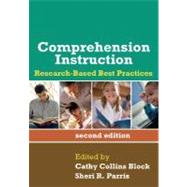
Cathy Collins Block, PhD, has served on the graduate faculty of Texas Christian University (TCU) since 1977. She presently serves, has served, or was elected to serve on the Board of Directors of the International Reading Association, National Reading Conference, Literacy First, New Zealand AWARD Program, U.S. Department of Education Regional Research Laboratory, Pacific Resources for Education and Learning Laboratory, National Center for Learning Disabilities, IBM Education Board of Advisors, National Center for Learning Disabilities, America Tomorrow, and Nobel Learning Communities. Dr. Block has written more than 250 research articles, books, and chapters concerning comprehension development, vocabulary achievement, exemplary teaching practices, and effects of curricular initiatives on student literacy success. She has taught every grade level, from preschool to graduate school, and served as consultant to hundreds of school districts in the United States and around the world. In 2005, she received the highest award bestowed by TCU to a professor for her outstanding teaching and scholarship across the country: the Chancellor’s Award for Distinguished Teaching and Scholarship.
Sheri R. Parris, MEd, is currently completing her PhD at the University of North Texas while teaching undergraduate reading courses. Her major area of study is reading education, with a minor in neuroscience. As a former middle school teacher, her emphasis is on secondary reading issues. Currently, she serves as Secretary and Vice President of the Gifted and Talented Special Interest Group of the International Reading Association (IRA) and has recently served on the IRA Adolescent Literacy Committee. Ms. Parris was invited to speak at the 2007 IRA conference to present "The Expertise of Adolescent Literacy Teachers," published in April 2007 in the Journal of Adolescent and Adult Literacy. Additionally, she coauthored two chapters in the 2006 book Collaborative Literacy: Using Gifted Strategies to Enrich Learning for Every Student (by Susan E. Israel, Dorothy A. Sisk, and Cathy Collins Block), which was nominated for the 2007 Ed Fry Book Award of the National Reading Conference.
| Introduction | p. 1 |
| Theoretical Directions for the Future: What We Have Learned Since the National Reading Panel Report (2000) | |
| Beyond Borders: A Global Perspective on Reading Comprehension | p. 9 |
| Research on Teaching Comprehension: Where We've Been and Where We're Going | p. 19 |
| Dual Coding Theory: Reading Comprehension and Beyond | p. 38 |
| Cognitive Flexibility and Reading Comprehension: Relevance to the Future | p. 50 |
| Metacognition in Comprehension Instruction: What We've Learned Since NRP | p. 65 |
| Constructivist Theory and the Situation Model: Relevance to Future Assessment of Reading Comprehension | p. 80 |
| Neuroscience: What Brain-Based Research Tells Us about Reading Comprehension | |
| Looking at Reading Comprehension through the Lens of Neuroscience | p. 101 |
| Using Neuroscience to Inform Reading Comprehension Instruction | p. 114 |
| How Neuroscience Informs Our Teaching of Elementary Students | p. 127 |
| How Neuroscience Informs Our Teaching of Adolescent Students | p. 142 |
| Improving Comprehension Instruction | |
| Transforming Classroom Instruction to Improve the Comprehension of Fictional Texts | p. 159 |
| Explicit Instruction Can Help Primary Students Learn to Comprehend Expository Text | p. 171 |
| Explanation and Science Text: Overcoming the Comprehension Challenges in Nonfiction Text for Elementary Students | p. 183 |
| Learning to Think Well: Application of Argument Schema Theory to Literacy Instruction | p. 196 |
| Improving Reading Comprehension through Writing | p. 214 |
| New Insights on Motivation in the Literacy Classroom | p. 226 |
| Differentiated Comprehension Instruction | |
| Comprehension Instruction in Action: The Elementary Classroom | p. 241 |
| Comprehension Instruction in Action: The Secondary Classroom | p. 258 |
| Comprehension Instruction in Action: The At-Risk Student | p. 271 |
| Comprehension Instruction for English Learners | p. 294 |
| Technology and Comprehension Instruction: New Directions | |
| Games and Comprehension: The Importance of Specialist Language | p. 309 |
| Research on Instruction and Assessment in the New Literacies of Online Reading Comprehension | p. 321 |
| Scaffolding Digital Comprehension | p. 347 |
| Technologically Based Teacher Resources for Designing Comprehension Lessons | p. 362 |
| Conclusion | |
| Summing Up | p. 381 |
| Epilogue: What the Future of Reading Research Could Be | p. 391 |
| Author Index | p. 415 |
| Subject Index | p. 431 |
| Contributors | p. 445 |
| Table of Contents provided by Ingram. All Rights Reserved. |
The New copy of this book will include any supplemental materials advertised. Please check the title of the book to determine if it should include any access cards, study guides, lab manuals, CDs, etc.
The Used, Rental and eBook copies of this book are not guaranteed to include any supplemental materials. Typically, only the book itself is included. This is true even if the title states it includes any access cards, study guides, lab manuals, CDs, etc.